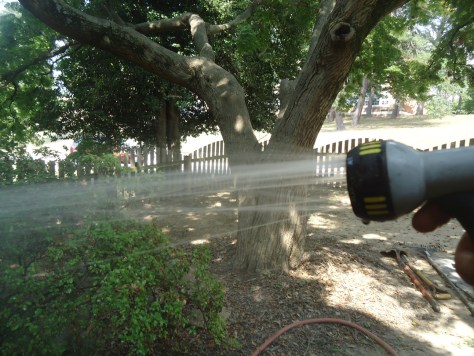Pressure Washing Basics :: Like Sweeping with Water
******
Cleaning with “House Wash” from Krud Kutter
This post was originally sponsored by Krud Kutter, but the information applies regardless of the products you choose. Check Krud Kutter’s Shop on Amazon for a wide array of products.
One project close to the top of my personal to do list is pressure washing (and treating) my cedar fence. I had done about 70 feet or so along the back a few years ago, and now, I just so badly want to give the rest a similar type of sweet attention.
Enter Krud Kutter (now owned by Rust-oleum) and the opportunity to review their Multi-Purpose House Wash. Hmmm, “Great on decks … and concrete … and brick … and fences, as well as … with all around cleaning, on many other surfaces all around your house. Great with a pressure washer or just mix and apply by hand ….”
So, of course, I was all like Booyah! (*add spirited hand motion here*)
I mean – I was already a big fan of their environmentally friendly cleaning formulas. (A few years back, I discovered and posted about their Must for Rust product in the post – Removing Rust from Hardware).
This time, though, I could wash my fence. I could. But alas, that project was not currently on the team to do list. Patio, yes … exterior paint and side porch work, okay. “But your fence will have to wait for next year,” Mrs. Moxie said.
*Wahn Wah*
:~)
Common Pressure Washing Projects
But wait! … She said, “There are plenty of other items you can do your power washing on ….”
- A side porch getting some skirting (in conjunction with patio work).
- A kinda gross set of mildew stains at the base of the siding on the front of the house.
- Plus possibly many, many more tasks you just couldn’t fit on a small(ish) sized list.
Okay, I added that last one. But surely I have enough already (Right?) to show you some basic pressure washing basics.
Using Krud Kutter’s Multi-Purpose House Wash with a Pressure Washer
First, let me say that using a pressure washer (kinda like painting) is something everyone seems to think they can do. That is – until a job turns horribly wrong. Ha! Be warned: Never start the spray of a power washer when it is pointed directly at the surface you intend to clean. What I mean is … start the spray, only then fade into the surface you are power washing. You do this, especially on painted surfaces, as to avoid accidentally removing large hunks of material.
Note on Equipment: My Husky Power-Clean 1000 (seen in this post) is a basic homeowners model with three tips only. Rated at 2200 PSI and at 2.0 GPM, it is perfect for the application pictured here. A black tip is used with solutions (like House Wash) and applying cleaner. A green tip yields a 25 degree spray and an even tighter red tip produces a 0 degree, laser-beam spray (which I don’t think I have ever actually used).
Pressure Washing Basics
* Once set up (a garden hose and the wand connected), start the engine and turn on the water at the hose bib. (Here, I’ll do a quick test on pressure and spray and tighten things up if I see leaks.) When working near siding, I like was, it might make sense to cover the base of the siding so water doesn’t get up and get pushed behind.
* As directed on the bottle, pre-wet the surface you are working on. (You can do this with the cleaning tip installed or not.)
* When you are ready to get down to cleaning, simply place the washer’s siphon tube into the bottle. (Make sure it reaches all the way to the bottom of the bottle.)
* Apply cleaner using the appropriate cleaning tip. (Note: This stuff can go fast, so work fast as you apply.)
* Just prior to finishing any area, and leaving the heaviest soiled spots for last, I usually stop and remove the siphon hose from the bottle. (I remove the quick-connect tip from my wand at this point too. I do this for two reasons: 1.) It allows any solution in the lines to flow just a little more freely and 2.) It also helps clear any of the remaining solution out of the system.)
* Allow the cleaning solution to sit on the surface for 5 to 10 minutes. Do not allow your solution to dry on the surface.
Notes on How to Use a Pressure Washer
* Use the washer (me with my green 25 degree tip) to rinse treated surfaces. To work most effectively, think of this almost like … sweeping. Back to forward on flat surfaces; Top down on vertical surfaces … working slowing and overlapping your spray pattern (and never getting too close as to dig into the surface).
(On extremely soiled or mildewed surfaces, it may be necessary to scrub with a soft bristle brush, and a second application may be needed.)
IMPORTANT! Krud Kutter (on reading the bottle) recommends wetting any nearby plants both before and after you work. The product itself will not harm plants, but again I don’t want to find out.
Using Krud Kutter’s Multi-Purpose House Wash, Mixed & Applied by Hand
There were a few mildew spots on our wood siding, which developed when our gutters were, well, off the house. After a quick test, I decided that the paint here couldn’t quite handle a power washing. I decided to tackle this area by hand and used the formula described below.
* For a manual mix, one pint to one gallon of water. Mix in a bucket (which is easier of course if your bucket has markings on the inside).
* As with pressure washing, wet the surface (with a garden hose) prior to applying your cleaning solution. (Also wet vegetation that happens to be nearby.)
* While you can use a pump sprayer, a brush or a roller to apply, I used a mop for my spots.
* Let soak for about 5-10 minutes. Hitting it lightly with a scrub brush if the stain is tough.
* Rinse with the garden hose. Viola!
For about using Krud Kutter by hand, see this article from Pretty Handy Girl.
Why is Krud Kutter’s House Wash So Effective?
The proprietary formulation of KRUD KUTTER House Wash contains “Sporex”™, a unique additive which removes tough stains from mildew, mold, algae, fungus and moss, and leaves the surface completely clean. In addition, special surfactants penetrate the surface to safely and easily dissolve the toughest stains from dirt, oil, grease, bird droppings, tree sap, and acid rain. It is even said to remove gray weathering on wood, chalking, as well as oxidation.
It is recommended for exterior siding (wood, vinyl, aluminum), roofing, gutters, wood/composite fences and decks, stucco, brick and cement block, masonry, driveways, walkways and walls, even RV’s, patio furniture, and boats.
Before using any cleaner, you should read the label and test it in an inconspicuous area. Additional information on Krud Kutter‘s House Wash or to purchase on Amazon using our affiliate link, here. (Thank You!)
*******
Thanks for reading and stay clean my friends. For more great tips on maintaining your home, please see our category Make, Maintain, Fix. For more on Exteriors, there. ~jb




















Wow JB. That was quite the before and after shot! It also looks like your clean up went fairly quickly. I’m still on the fence about buying a pressure washer.
I should have kept going and just stripped the paint off of that slider. ha! and I really am hoping to make some big improvements in this side porch area by Spring. Like our dining room, it has always kinda been one of our dumping zones … sadly. Anyways, enough on my todo list. Thanks Brittany for stopping by. ~jb
oh and I should have said, I don’t use my pressure washer a ton (good hi-range basic model in the $200-$250 neighborhood) but when I do, it always seems to get the job done.
Thanks for all the home improvement advice! You’ll be growing my Home DIY page on Pintrest!
thanks for your support Debbie. happy to share.
It’s amazing the difference that a little pressuring washing can do :)
you should see my concrete pond, which I cleaned but decided not to do this season. a pressure washer can be very effective. thanks Shannon.
I’ve actually used this product before and had great success with it. I love when Rob uses the pressure washer. It really makes a big difference!
ha! it’s like we wish we had more stuff to powerwash. can never get to it all.
Oh my! What a difference! That must have been super satisfying!
oh it was. it was. thanks for stopping in Leanne. ~jb
feel free to come refine your techniques at my house! lol!
ha! cheers Jocie.